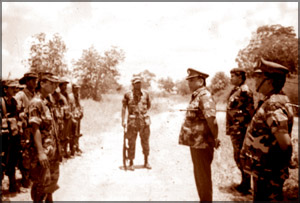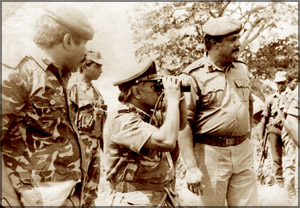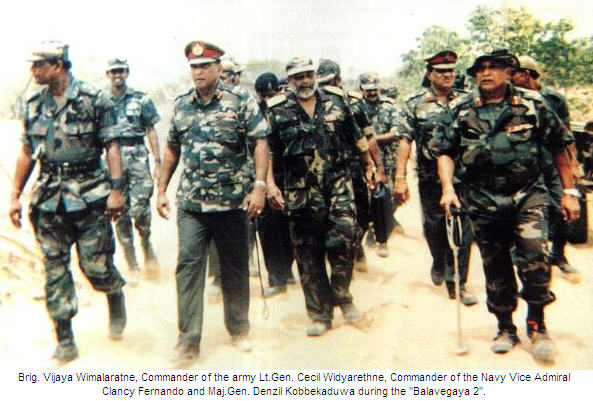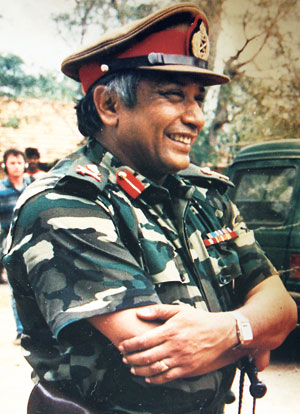
“Why should we let anyone else fight our war?”
Lieutenant General Denzil Lakshman Kobbekaduwa RWP, RSP, VSV, USP, rcds, psc, SLAC (July 27, 1940 – August 8, 1992) was a highly decorated and respected General who served the Sri Lanka army. Born into a traditional Kandyan Family, Lieutenant Kobbekaduwa was the second child and eldest of three sons. Educated at Trinity College Kandy, he was a colourful military officer and a fine rugby personality. He met with an untimely tragic death whilst commanding the security forces in the North, when the vehicle that carried him travelled over a pressure mine. The whole nation wept for the loss of this great human being. A gentleman on and off the military and rugby fields, he was a fine warrior to be remembered of.
Rugby Life
He excelled in rugby football during his college years, playing as scrum half. This was adjacent to being an excellent hockey player. He became the Trinity Rugger Captain in 1959 and was also awarded the prestigious Trinity Lion Award for Rugby in 1959. Denzil Kobbekaduwa led the Trinitians to victory against Royal College with 5-0 in the first leg of the Bradby match played on 4th of July 1959. In the second leg, it was a close game where Royal College was subsequently on top with 6 points to nil.
After his studies at Trinity, he joined the Sri Lanka Army as an Officer Cadet. Even though he joined the Sri Lankan army, Denzil continued to play Rugby even afterwards.
Playing for Kandy Sports Club from 1967 to 1970, his finest year in rugby was 1969, when, under his leadership, the Kandy Sports Club entered the Clifford Cup finals after fourteen long years. In that season the Kandy SC side rose to great heights to beat the League champion Havelocks, SC 11-8 in the quarters, CH & FC 3-0 in the semi-finals, while in the finals they went down fighting to CR & FC by 6 points to 12.
Also playing rugby football for Sri Lanka, Denzil captained the Sri Lanka Rugby National Team, Coached, Refereed and Administered the game on a national level being the only rugby personality of any school in Sri Lanka to do so until now.
Denzil was also privileged enough to coach the 1st XV Trinity rugby side in 1969 and was also appointed as the Secretary General of the Sri Lanka Rugby Football Union in 1974.
Military Career
 Lt. General Kobbekaduwa joined the army in May 1960 and received his training at the Royal Military Academy, Sandhurst, England. After returning to Sri Lanka, he was commissioned as a Second Lieutenant in the 1st Reconnaissance Regiment of the Sri Lanka Armoured Corps.
Lt. General Kobbekaduwa joined the army in May 1960 and received his training at the Royal Military Academy, Sandhurst, England. After returning to Sri Lanka, he was commissioned as a Second Lieutenant in the 1st Reconnaissance Regiment of the Sri Lanka Armoured Corps.
Although the army was more a parade ground army at that time, Lt. General Kobbekaduwa was to see that it turned into a well trained, battle hardened and disciplined army.
General Kobbekaduwa was well liked both by his superiors, peers, and subordinates, and his promotions within the army came swiftly.
Denzil was also a graduate of the Royal College of Defense Studies and the British Army Staff College at Camberley.
Lt. Kobbekaduwa was an excellent strategist, who achieved maximum advantage from minimum resources, commanding the respect of even the LTTE for his strategic skills and military tactics. He was quoted as saying “Why should we let anyone else fight our war?” His sense of justice made him realize that although the Tigers were all Tamil, it did not necessarily mean that all Tamils were members of the LTTE. He wanted to win the confidence of the civilian population and make them realize that they were better off trusting the government and the army.
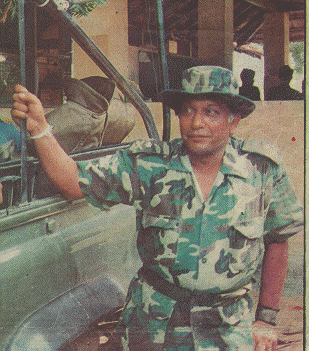
He was fighting an enemy who had access to a large stock of arms and an advanced military infrastructure with limited manpower and finances. This made it difficult to hold on to territory and subjugate the people of the area to a military rule while continuing to wage war against a guerrilla army.
One of the most famous victories executed by Lt. General Kobbekaduwa was the plan of action behind the breakage of the siege at Elephant Pass. The attack on the army camp at Elephant Pass, which was launched on July 1991 was planned by Velupillai Prabhakaran himself who named it “Operation Charles Anthony”.
Prabhakaran dared to come out of hiding to visit the LTTE forward areas, prior to launching this attack. The attack was launched with about 3000 personnel (men and women drawn from the North and East) but at the height of the battle this number rose to about 6000. The LTTE leader was willing to sacrifice anyone to conquer this location while he directed the attack himself from his hideout in Chavakachcheri.
With no tanks and heavy armour, 8000 men were deployed for the rescue mission to relieve the besieged camp and regain territory captured by the LTTE. This was an amphibious operation backed with helicopters carrying troops. Lt. General Kobbekaduwa was in the landing craft leading his men from the front, taking the same risks as his men.
The tactics used by Lt. General Kobbekaduwa in breaking this siege were unprecedented in the annals of Sri Lankan military history. The execution of these plans was all in the hands of Lt. General Kobbekaduwa.
The Adampan operation is another instance that duly depicts his bravery. Here the armed forces waged a two prong attack: one in the south-eastern entrance of Madhu Adampan base region, while the main thrust was in the north western sector. It was only later the LTTE realized that while their forces were engaged, the army had interdicted their supply lines in the area where the Mannar coast was linked to the jungle base of the Wanni. The planning was by Kobbekaduwa who obtained maximum advantage from minimum resources showing true attributes of a great military leader.
He used three principles in his counter-insurgency war measures:
1. He did not believe in holding down land.
2. He believed in drawing the enemy away from populated areas to minimize civilian deaths, while destroying the enemy’s firepower with advanced maneuvering and superior firepower.
3. Making the civilians realize that they were better off trusting the armed forces.
For his actions, the UNHCR paid a tribute to him for his humanitarian approach towards the beleaguered Sri Lankan population in the North and East.
He was promoted to Major General in 1990 and was posthumously promoted to Lieutenant General in 1992, one of the highest ranks in the Sri Lankan Army.
Commands Held: Overall Operations Commander, Northern Sector, and General Officer Commanding Division 2
Famous Operations Involved In: Operations Balavegaya, Liberation and Adampan
General Denzil Kobbekaduwa commanding forces on the field
Awards:
Rana Wickrama Padakkama
Rana Sura Padakkama
Vishista Seva Vibhushanaya
Uttama Seva Padakkama
Many war pundits have called Denzil Kobbekaduwa an “exceptional Third World General”. This is an indication of his innate talent of carrying out a campaign under third world conditions, where funds were limited and every resource had to be carefully nursed.
He was assassinated along with 9 other military officers in a land-mine explosion on August 8th 1992, but his services to the country waging war against the terrorists to liberate Sri Lanka will not be forgotten. The General was universally loved by all his troops and venerated as an honest, compassionate, naturally born leader by all citizens throughout our great nation irrespective of their ethnic differences. The General was seen by the citizens to have the potential to one day be the President of mother Lanka. Denzil’s name will be remembered among countless other war heroes who gave up their lives for a better tomorrow. He inspired millions during his life, but inspired millions more even after his death.
“When the General was the Commanding Officer of Armored Corps, everyday, on his way to the officers’ mess for lunch he would stop at the other ranks’ mess and check their lunch. General Kobbekaduwa first served a little bit each from the soldiers’ food before he started on his own lunch. If the food was not up to his standards, the quartermaster (person in charge of food) was in for a long talk by the General.
Another instance in which I was humbled by his actions was when I was walking with him to the officers’ mess, a group of soldiers saluted and greeted him. He returned the salute and asked one corporal whether his wife delivered their baby. The soldier replied saying that his baby was not born yet, but was expected that same day or the following day. Gen. Kobbekaduwa instructed one of his officers that this soldier be given a few days off and also instructed his driver to take this soldier to where his wife was, in Gampaha, in his jeep. This action showed the true greatness of the General.
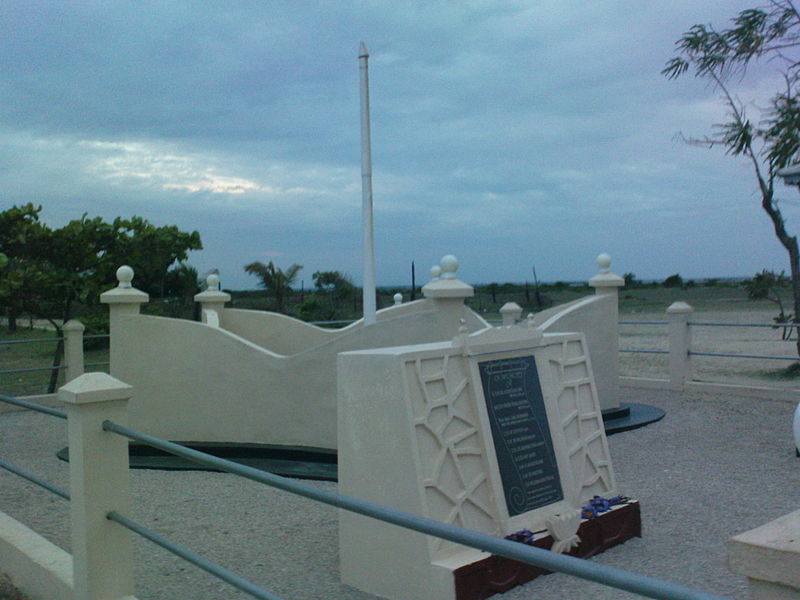 Lieutenant General Denzil Kobbekaduwa Memorial
Lieutenant General Denzil Kobbekaduwa Memorial
Sri Lanka lost a great son. We lost a great leader, a hero and a gentleman. Lali and the children lost a great father. I lost my idol. The only regret I have is that I was not able to serve with him for a longer period due to unavoidable circumstances.
My mind is not disciplined enough to be void of “Thrushna”, and I would think, let me have another chance of being Gen. Kobbekaduwa’s subordinate officer in my next birth. But, in this instance, I will eliminate that thought to pray, and say, “May you attain Nirvana kind sir, for all the good things you have done, and because, you do not deserve to be born again in this cruel world” – Colonel Lalith Gunaratna
Article Prepared By Yashwanth Dahanayake
Sources: Wikipedia, Sunday Leader, Daily News, The Nation, spur.asn.au, Lanka Library
Click Here to read the article containing the list of Trinity Old Boys who served in the war against the LTTE.
Related Posts:
Published 13 years ago by


